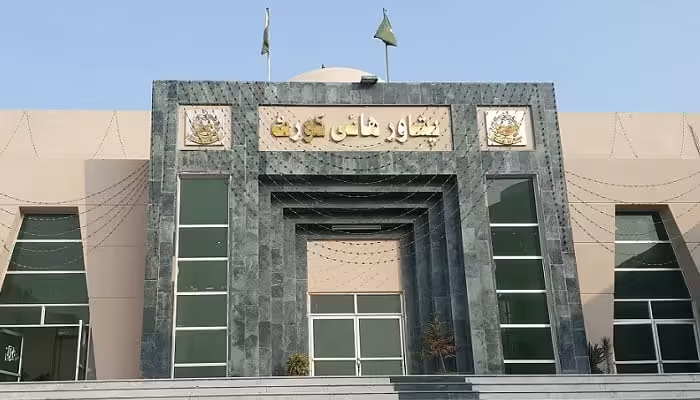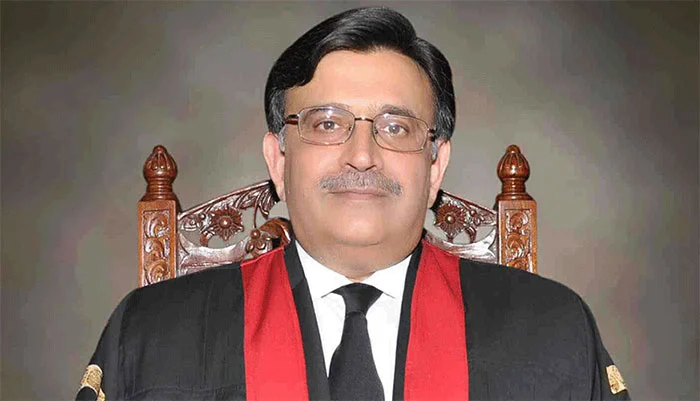The establishment of constitutional benches in the Peshawar High Court remains in a state of uncertainty following Pakistan’s 26th constitutional amendment. While other provincial assemblies have moved forward, the Khyber Pakhtunkhwa (KP) government has yet to pass a resolution required to form these specialized benches, sparking concerns across the political and legal spectrum.
KP Law Minister Aftab Alam recently clarified that no official directive or demand has been communicated to the provincial government regarding the formation of constitutional benches. According to Alam, even the federal government is uncertain about the full implementation of the amendment, with both judiciary and Supreme Court officials making statements that highlight this ambiguity. “The federal government itself is confused about the constitutional amendment, and the judiciary and the Supreme Court are also unclear in this regard,” he stated, hinting at a larger structural uncertainty on a national scale.
Constitutional Benches and the Need for a Resolution
The formation of constitutional benches was outlined as a constitutional requirement with the 26th amendment, aiming to bring a more systematic approach to high court proceedings on constitutional matters. Each province is expected to pass a resolution, allowing its high court to establish a constitutional bench of at least five judges, which would handle cases with broader constitutional implications.
Despite this directive, the KP Assembly has yet to pass the necessary resolution. Opposition members are urging the provincial government to act swiftly, arguing that any further delays could lead to financial, economic, and political repercussions for the region. Ahmed Kundi, the Parliamentary Leader of the People’s Party in KP, expressed these concerns, stating, “If constitutional benches are not formed, the province will suffer financial, economic, and political losses.”
Kundi further emphasized that this requirement is not a matter for political maneuvering. He urged the KP government to pass the resolution responsibly, warning that, if the government does not act, the opposition will consider taking the matter to court.
Legal Implications and Provincial Standpoints
Without a constitutional bench, the Peshawar High Court lacks a dedicated platform to address high-stakes legal issues, creating a potential bottleneck in processing cases of constitutional significance. This could impede the handling of cases that involve vital financial and governance matters, directly impacting the people and provincial stability.
In other provinces, assemblies have already passed resolutions and are in the process of implementing the constitutional bench system in their high courts. However, KP remains at a standstill, which has sparked frustration among political and judicial observers.
The law minister pointed out that, per procedure, the provincial government would begin consultations if a formal proposal or request were made by the judiciary. Yet, critics argue that the amendment itself serves as sufficient instruction, and KP’s hesitation to move forward appears to lack justification. Opposition members, including Kundi, are pressing the government to take proactive steps to fulfill the constitutional requirement without waiting for additional directions.
Broader National Context and Potential Legal Recourse
The 26th amendment underscores a nationwide push for judiciary efficiency, aiming to alleviate case backlogs by empowering high courts with dedicated constitutional benches. The recent delays in KP, however, suggest that the amendment’s implementation may face broader challenges at both provincial and national levels.
The ambiguity surrounding the amendment’s interpretation has led to mixed responses from judiciary representatives and federal officials, which has only added to the confusion. Statements from Supreme Court judges have also highlighted the need for clarity, suggesting that KP is not the only region experiencing uncertainty. Nonetheless, KP’s opposition maintains that, in the absence of federal clarification, passing the resolution is a logical step toward aligning with the constitutional requirement.
Should the provincial government remain inactive, Kundi and other opposition members are prepared to seek legal recourse by petitioning the court. Their intention is to ensure that constitutional requirements are respected and fulfilled, aligning KP with the rest of the country. For them, the formation of a constitutional bench is not merely an administrative task but a matter of legal integrity and provincial representation.
What’s at Stake for Khyber Pakhtunkhwa?
The consequences of further delays are potentially severe. By failing to establish a constitutional bench, KP could face delays in addressing critical cases that influence governance, financial policy, and public welfare. The bench’s absence may slow down judicial processes, hampering progress on pressing constitutional matters within the province. Ahmed Kundi pointed out the potential impact on regional growth, emphasizing that legal and administrative lags ultimately affect the public.
Passing the resolution would not only comply with federal requirements but also foster confidence in the provincial judiciary’s capability to handle complex constitutional matters. If KP lags in establishing a constitutional bench, it may impact how the region’s legal matters are viewed on a national level, potentially influencing public perception and political dynamics.
Moving Forward: Steps for the KP Government
Given the mounting pressure, the KP government will likely need to clarify its position on the resolution. If further consultation with the judiciary is required, the government may expedite discussions to ensure that the high court is equipped with the necessary framework to handle constitutional cases. Law Minister Aftab Alam has signaled that the government is open to consultation, suggesting a potential resolution if requested by judicial authorities.
The establishment of constitutional benches, as outlined in the 26th amendment, represents a significant step toward judicial modernization and efficiency across Pakistan. For KP, this transition is an opportunity to enhance its judicial system, offering faster, more efficient processing of cases with constitutional implications. The delay, however, highlights the ongoing need for clear communication and alignment between provincial and federal authorities.
The formation of constitutional benches in the Peshawar High Court remains a matter of debate, but the implications are clear. With opposition leaders threatening court intervention, the KP government faces growing pressure to act promptly. As provinces across Pakistan move forward in implementing the constitutional amendment, KP stands at a crucial juncture where compliance is not only a constitutional duty but also a path toward improved judicial efficiency and provincial empowerment. The decision to pass this resolution could have lasting effects on KP’s legal landscape, ensuring that the province’s high court aligns with national standards and effectively serves its people.



